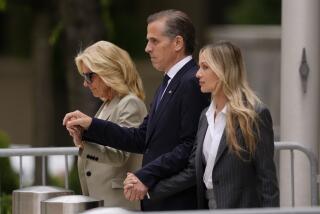COLUMN ONE : Unwritten Rules Face a Rewrite : Senate ethics in the time of Henry Clay and Daniel Webster would be a scandal today. Current codes remain decidedly vague. The ‘Keating Five’ case seems certain to lead to revisions in standards.
In the 19th Century, the giants of the U.S. Senate had a special affinity for constituent service: They drew salaries from powerful businessmen while serving on Capitol Hill.
Thomas Hart Benton of Missouri was paid by John Jacob Astor’s American Fur Co.; Henry Clay of Kentucky worked for James De Wolfe, a slave trader, and the great orator Daniel Webster of Massachusetts was on the payroll of the Bank of the United States. Webster even complained to the bank managers that “my retainer has not been renewed, or refreshed as usual.”
By today’s definition of morality, those payments would be considered bribery, and the senators who accepted them would be disgraced, if not indicted and convicted. Political ethics have changed remarkably since the days of Benton, Clay and Webster.
Now, the moral ground may be shifting yet again as the Senate Ethics Committee examines the role of five senators accused of being at the beck-and-call of a single powerful constituent, indicted savings and loan mogul Charles H. Keating Jr.
No one doubts that senators should serve their constituents. “The practical experience of elected officials is that citizens expect such intervention (against bureaucrats), and would demand help if it were not forthcoming,” says Sen. Terry Sanford (D-N. C.), one of the six Ethics Committee members who are sitting in judgment of their colleagues.
But did the five senators--Alan Cranston (D-Calif.), Dennis DeConcini (D-Ariz.), Donald W. Riegle Jr. (D-Mich.), John Glenn (D-Ohio) and John McCain (R-Ariz.)--cross the acceptable line that separates public service from pandering? And did they intervene improperly with federal regulators to delay action against Lincoln Savings & Loan Assn., the thrift institution controlled by Keating that later collapsed, costing taxpayers $2 billion?
The senators in the dock insist they were only doing their jobs of fighting for constituents--something every senator does. As DeConcini told the committee: “I wish I kept a notebook of all the senators, including a couple on this committee, who have said ‘but for the grace of God, there go I or you.’ ”
With the public and the press increasingly agitated over the savings and loan debacle, the “Keating Five” senators are in danger of becoming the most visible symbols of the huge financial scandal. The shutdown and disposal of hundreds of defunct thrifts will cost the taxpayers at least $130 billion, not including future interest payments on the bonds needed to finance the cleanup.
Whatever the fate of the five senators, the Keating Five case seems certain to lead to revisions in the current--and decidedly vague--Senate ethics code, which says only that members should refrain from “improper conduct which may reflect upon the Senate.”
The Senate--and probably the House as well--will be struggling to define explicitly what kind of help a lawmaker may ethically provide to campaign contributors. And the debate could give some impetus to the campaign for public financing of elections.
“What they are going to do is redefine the line, as it’s constantly been redefined,” says Donald Ritchie, the assistant Senate historian. “Ethics are situational, and every once in a while the institution just stops and rewrites the rules.”
Defining political morality is an onerous burden that civilized men and women have been struggling with since governments came into being. “Reward, not bribe; access, not vote--the claimed distinctions had circulated since the days of Rome,” Federal Judge John T. Noonan Jr. laments in his book, “Bribes.”
Although Benton, Clay and Webster appear to have escaped any disparagement, more than a few lawmakers and public officials had trouble over the years making a distinction between acceptable practice and unethical behavior.
The last big scandal involving as many members of Congress as the Keating Five affair occurred in the early 1870s. Two senators were censured--and several others publicly embarrassed--as a result of an admission by Rep. Oakes Ames (R-Mass.) that he had distributed stock in Credit Mobilier, the Union Pacific Railroad’s holding company, in places “where it would do us the best.” The scandal, which came at about the same time that Mark Twain wrote his celebrated book on American politics, “The Gilded Age,” soiled the reputation of the Congress for decades to come.
But the lawmakers sometimes have been harsher on members of a sitting Administration than on their own colleagues.
A special Senate investigating committee exposed the great political morality play of the 1920s, the Teapot Dome scandal. Secretary of the Interior Albert B. Fall gave two oil companies leases to drill at the Navy’s oil reserves at Teapot Dome, Wyo., and Elk Hills, Calif. One oilman gave Fall a “little black bag” with $100,000 in cash, and another purchased an interest in Fall’s ranch. Fall was convicted of bribery. Atty. Gen. Harry Daugherty and Navy Secretary Edwin Denby resigned after a public outcry about their failure to take action in the case.
It was still common practice for lawyers in Congress to accept fees from big American corporations--as Benton, Clay and Webster had done--until the early 1930s. But Sen. Huey Long (D-La.) helped to bring that to an end by making public a list of all the big U.S. companies that had retained the tiny Arkansas law firm of Senate Democratic leader Joseph Robinson, obviously just to curry Robinson’s favor. Shortly after, the Senate drafted new rules to prevent corporate interests from buying influence in that manner.
Until the early 20th Century, the most celebrated cases of congressional wrongdoing involved members who lined their own pockets. But as the cost of campaigning for reelection began to increase, it wasn’t too surprising that questionable campaign contributions became an important part of the modern-day political scandal.
Perhaps the first real campaign finance controversy involved Truman Newberry, a Michigan millionaire who defeated automobile manufacturer Henry Ford for a Senate seat and later was accused by his opponent of wrongdoing in the way he financed his campaign. Newberry was eventually convicted and resigned.
Campaign spending was restrained by congressional rules until a mid-1970s Supreme Court case, in which U.S. Sen. James L. Buckley (R-N.Y.) established the right of a wealthy individual to spend unlimited sums of money on his own campaign. The decision undermined some post-Watergate efforts to impose restrictions on election spending. It also unleashed a furious scramble for campaign funds, opening members of Congress to the kinds of conflicts being examined in the Keating Five case. Ever since, the cost of winning office has escalated alarmingly.
While George Washington won a seat in the Virginia House of Burgesses after passing out a modest amount of wine and liquor to would-be supporters in 1757, these days a U.S. senator must raise an average of $12,000 a week during his six-year term to finance his reelection drive, while a House member must gather $4,000 a week. In California, where the last Senate campaign cost about $20 million, the cost is even higher--$60,000 a week.
Congress never actually got around to policing itself formally until the mid-1960s, when a scandal involving White House aide Bobby Baker, who earlier had served as secretary of the Senate, proved too much even for the upper chamber. Prodded by the harsh public backlash, lawmakers created a Select Committee on Standards and Conduct, which evolved--in 1977--into the Senate Ethics Committee. The House established its own ethics panel shortly after that.
Still, there was plenty of room for misbehaving. The few reforms enacted by Congress dealt almost solely with the mechanics of raising and giving money. Nowhere did Congress say how its members should behave in dealing with people who gave them money for campaigns.
These donors--along with other, less well-heeled citizens--legitimately need champions in the struggle with the excesses of big government. Indeed, the Supreme Court said in the early 1970s that members of Congress should be expected to intervene with federal agencies on behalf of constituents.
Political scientist Norman Ornstein argues that in a world of powerful bureaucrats, members of Congress serve as a check on the unfettered use of power by federal agencies. He cites the current wave of stories about overzealous banking regulators leaning on financial institutions to curtail loans as a perfect example of the need for congressional intervention.
Nevertheless, not even the most aggressive members of Congress would argue that their powers to alter actions of an executive branch agency are limitless. But the question remains: Where do you draw the line?
Stanley Brand, a former counsel to the House and now the personal lawyer to many lawmakers, contends there is “no rule, statute or standard of conduct currently on the books to give people notice of what they are not supposed to do.”
That is the view taken by the lawyers for both Cranston and DeConcini in battling the Keating Five charges. Cranston’s message to the committee was simple: I have violated no rules. If you condemn me, you condemn yourselves and the entire system.
Indeed, precisely because the standard is so nebulous, the Justice Department hasn’t filed a campaign contribution corruption case since 1969, when Daniel B. Brewster, a former Democratic senator from Maryland, was charged with having taken bribes from a lobbyist for the Spiegel Catalog Co. in return for promising to fight higher postal rates. Brewster was tried and convicted, but the conviction was reversed on appeal.
Over the years, Congress has been reluctant to draw a hard-and-fast line in these cases because all members are so frequently involved in such activities.
As Ornstein put it: “It’s as if you were dealing with a bunch of people who had committed adultery. Some did it just once, some were chronic philanderers and others fell somewhere in the middle. Where do you draw the line of what is sin in this case?”
Nevertheless, it is clear from interviews with senators and House members that most of them observe some simple, unwritten rules when it comes to intervening with federal agencies on behalf of contributors and other constituents:
--First, most members of Congress make a distinction between intervening in judicial or enforcement proceedings and all other types of government activities. They do not intervene in judicial or enforcement actions without considerable proof that the constituent has been wronged.
--When they contact an enforcement agency such as the Justice Department, the Internal Revenue Service or the Securities and Exchange Commission, members of Congress normally abide by the notion that they should discuss only process, not outcome. They ask for expedited consideration of the constituent’s case or for greater fairness and due process, but they do not usually ask that a case be dropped.
Ornstein says it isn’t unusual for members of Congress to negotiate with an enforcement agency a procedure for speeding up action on a case that is acceptable to both the constituent and federal investigators. All contacts with regulatory government agencies are usually in writing, and politeness is generally the rule.
--Some members of Congress also make a distinction between the interests of an entire home state industry and one corporate executive such as Keating. Sen. Warren B. Rudman (R-N. H.) has said he sees nothing wrong in intervening with a federal agency for an industry, but would be more careful about intervening for a single firm.
Although some senators, such as Cranston, contend that these unwritten standards carry no weight in law, Ethics Committee counsel Robert S. Bennett argues that senators can be found guilty of wrongdoing if “reasonable persons” are persuaded that the legislator intervened on behalf of someone who provided “unusual favors or benefits.”
But the ultimate weapon in these cases--expulsion--hasn’t been used since the early treason cases in the Civil War. The punishment of the 1990s is public criticism and disgrace--a resolution of censure, denunciation or condemnation.
The Senate has broad authority to punish its members. It is not necessary to break a written statute or law. A member can be punished for acting “contrary to acceptable norms of ethical conduct” or engaging in “reprehensible” conduct that brings the Senate into “dishonor and disrepute.”
In the recent past, the Senate has censured its members for a range of misbehavior, including fighting on the Senate floor, abusing a post on a Senate investigating committee and engaging in financial irregularities.
During the 1970s, three congressmen were convicted of taking kickbacks from their office employees, who were forced to give their bosses a share of their earnings as staffers. Another House member was convicted of taking $41,000 to help influence federal regulators in approving an airline route. All served time in jail.
The Korean influence-buying scandal of 1977 embarrassed more than 20 members of Congress, who had received cash from Tongsun Park, a rice broker and prominent social figure in Washington political circles. Three California congressmen, including Rep. Edward R. Roybal (D-Los Angeles) were reprimanded in 1978, and former Rep. Richard T. Hanna pleaded guilty to conspiracy to defraud the government.
The Abscam scandal of 1978, in which FBI agents posed as Middle East oil moguls offering cash or stock for favors, resulted in the bribery convictions of five congressmen and a senator. Videotapes of the lawmakers being offered cash were shown on television, giving the public a dramatic view of official corruption. Rep. Michael (Ozzie) Myers, a Philadelphia Democrat, was expelled from the House--the first congressman ever kicked out for taking bribes.
But the congressional ethics committees remained largely moribund during most of the 1980s--until they were forced, in 1989, to take up the charges surrounding then-House Speaker Jim Wright (D-Tex.).
Wright finally resigned in 1989 after the House Ethics Committee charged him with 69 counts of financial improprieties. The key charge was that Wright had accepted $145,000 in gifts--in the form of salary for his wife, Betty, and the use of a car and a condominium--from Texas businessman George Mallick. Wright insisted that his wife had earned the money, and argued that Mallick had never asked him for help on any legislative or regulatory matter.
While past corruption scandals typically dealt with government officials who pocketed money, the Keating Five case is more subtle because it deals with allegations that lawmakers brought pressure on regulators to benefit a campaign contributor.
Although the Ethics Committee’s ruling in this case will surely set a new precedent, committee members have emphasized that it will not solve the underlying problem: The rising costs of election campaigns.
Fred Wertheimer, president of the citizens lobby Common Cause, predicts that the Keating Five scandal will move the Congress closer to enacting sweeping reforms of the campaign finance system, perhaps including some form of public financing of congressional elections.
The Senate and the House passed widely differing campaign reform bills earlier this year, but the two chambers could not agree on a compromise.
“This case,” says Wertheimer, “is going to provide whatever final proof that anyone ever needed that this system is broken and has to be fixed.”
More to Read
Get the L.A. Times Politics newsletter
Deeply reported insights into legislation, politics and policy from Sacramento, Washington and beyond. In your inbox three times per week.
You may occasionally receive promotional content from the Los Angeles Times.






